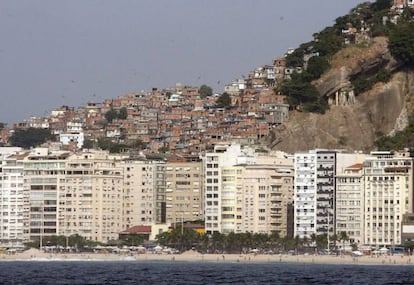Sluggish economy forces Brazil to make structural reforms
The winner of Sunday’s presidential election will have to balance the public finances


No expert will venture to say who will win Brazil’s presidential elections on Sunday – either the incumbent Dilma Rousseff of the Workers’ Party (PT), or Aécio Neves of the conservative Social Democratic Party of Brazil (PSDB), who are currently neck-and-neck in the polls.
But all economists agree that no matter who wins, the country is facing a bitter adjustment process and the winner will have to get to work balancing the public finances.
The sluggishness of the Brazilian economy, which is stuck in a technical recession, is not just affecting the entrepreneur who is selling less, or the employee who faces job insecurity. It is also dragging back the government, which is making less in taxes. What’s more, Brazil will end the year with growth of no more than 0.7 percent.
Rousseff has stimulated consumption by raising minimum wages and making cheap credit available
In her four years at the helm of the country, Rousseff has attempted to stimulate consumption by raising minimum wages and making sure plenty of cheap credit was available. But the economy became saturated by that approach, leaving businesses with lower profits and seeing investment fall.
Since 2011, in order to stimulate an economy that was no longer growing at the same rate, the Rousseff government — which is interventionist by nature — has granted industry subsidies to preserve jobs and maintained interest rates at public banks artificially low so as not to affect consumption and investment. The first goal was met: unemployment is still an admirable five percent. But the second target was not quite achieved.
And so the economy has returned to the center of the election campaign. In every televised debate, Aécio Neves accuses Rousseff of having pushed the country into a recession, and portrays himself as the savior of an economy in the doldrums. His favorite expression is “to grow again.” Neves criticizes the president for having pushed public works to the sidelines and taken inflation to dangerous levels of more than 6.5 percent.
Rousseff defends herself with the argument that the international situation has been very challenging, and notes that Brazil is one of the only countries that has managed to create jobs and lift people out of poverty despite the global financial crisis.
Still, the president admits to some mistakes (she has already announced that she will replace her much-criticized economy minister if she gets re-elected) but asserts that the country is ready to grow again as soon as international conditions improve.

“You get pessimistic when you start talking about the economy,” said Rousseff in the latest televised debate. “It’s not me, ma’am, it’s the IMF numbers,” her rival retorted.
Yet neither candidate has detailed just how they plan to tackle spending cuts, no doubt to save themselves early criticism. Rousseff simply says that she will preserve jobs while Neves says that he will create new ones.
According to Toni Volpon, head of Latin American analysis at Nomura Securities, a return to growth necessarily means higher taxes and greater unemployment. This expert considers that the more liberal Neves would make the adjustments faster with support from the financial markets, which clearly favor him over Rousseff.
Luiz Gonzaga Belluzo, an economist who was a trusted aide to former president Lula da Silva, claims that it is still possible to avoid adjustment measures by encouraging public and private investment.
“It is going to be a difficult year, no matter who the president is,” he says. “But anyone who tries to make adjustments without first returning the country to the path of growth is going to be chasing his or her own tail, like a mad dog.”
This expert believes that a wave of spending cuts like the ones implemented in Europe would be disastrous to economic growth.
Tu suscripción se está usando en otro dispositivo
¿Quieres añadir otro usuario a tu suscripción?
Si continúas leyendo en este dispositivo, no se podrá leer en el otro.
FlechaTu suscripción se está usando en otro dispositivo y solo puedes acceder a EL PAÍS desde un dispositivo a la vez.
Si quieres compartir tu cuenta, cambia tu suscripción a la modalidad Premium, así podrás añadir otro usuario. Cada uno accederá con su propia cuenta de email, lo que os permitirá personalizar vuestra experiencia en EL PAÍS.
En el caso de no saber quién está usando tu cuenta, te recomendamos cambiar tu contraseña aquí.
Si decides continuar compartiendo tu cuenta, este mensaje se mostrará en tu dispositivo y en el de la otra persona que está usando tu cuenta de forma indefinida, afectando a tu experiencia de lectura. Puedes consultar aquí los términos y condiciones de la suscripción digital.








































